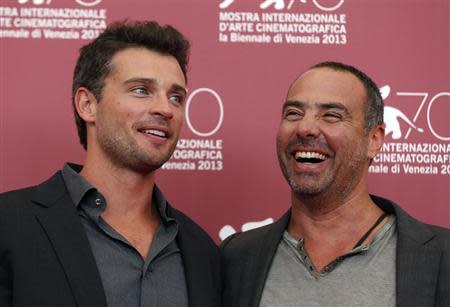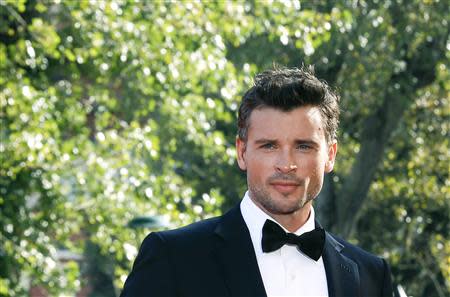JFK assassination film 'Parkland' shows gore, avoids conspiracy
By Michael Roddy VENICE (Reuters) - U.S. President John F Kennedy's assassination 50 years ago this year in Dallas is re-created in graphic detail, with a blood-smeared operating room and the famous film showing the actual event, in "Parkland" which had its premiere on Sunday in Venice. "What a shitty place to die," an aide to Kennedy says in the film named for the Dallas hospital where Kennedy was treated and died on the operating table. Zac Efron, former teen hearthrob from the "High School Musical" films, plays Dr. Charles Carrico, who started the emergency treatment of JFK. Paul Giamatti is Abraham Zapruder, the women's clothing manufacturer who happened to film the assassination with his home movie camera. The operating room where nurses and doctors struggle to save Kennedy while surrounded by frantic presidential aides and secret service agents is awash in blood touching everyone in a "very Shakespearean" way, director Peter Landesman said. Landesman, a former journalist, said he wanted to show what happened to the doctors, nurses, secret service agents, police and everyday people like Zapruder who were there on November 22, 1963 for an event that changed their lives forever. "The assassination of Kennedy had been understood from the level of speculation and mythology and politics and ideas of conspiracy and something unknown happening in the ether that may have coalesced to kill him," Landesman said at a post-screening press conference. "What we never really thought about was disorientation and the power and the chaos and the anarchy of what it was to seriously survive the assassination and that entire weekend." Conspiracy theories, which have been rampant since the assassination, do not figure in "Parkland", Landesman said. "For 50 years...the conspiracy speculation mythology has occupied a lot of emotion and intellectual real estate. That's there, that conversation is being had and always being had, it will never end. Our focus was really on the emotions, truths and survival." The film, which lasts a brisk 92 minutes, was shot by the same cinematographer, Barry Ackroyd, who brought a real-time feel to films by directors Paul Greengrass and Kathryn Bigelow. It chronicles the events over three days, from the time Kennedy was shot an hour after his arrival in Dallas, until his killer, Lee Harvey Oswald, shot the following day by Dallas nightclub owner Jack Ruby, was buried. The film pounces on the odd, poignant or telling details of that fateful weekend, such as the coincidence that Kennedy and his killer died a little more than 24 hours apart in the same hospital, Parkland Memorial. Secret Service agents are shown removing seats from the presidential plane so that Kennedy's body can be flown back to Washington accompanied by his widow, Jacqueline Bouvier Kennedy, and the new President Lyndon Baines Johnson, in the passenger compartment rather than in the cargo hold. Landesman said the 26-second-long Zapruder film, which has been pored over for clues to prove and disprove the assertion that Oswald, firing a cheap rifle from an upper floor of the Texas School Book Depository, acted as a lone assassin, was "probably the most examined film in the history of man". He said that the family had given permission for and licensed its use in "Parkland" where it is shown to eerie effect reflecting off Giamatti's glasses as law enforcement officers view it for clues. "We've seen it on the screens, on television but what I wanted to do as a filmmaker, as we all want to do as filmmakers, was to present this film as he (Zapruder) would have seen it...for the very first time," Landesman said. The film also shows Oswald's brother Robert, who worked at a clerical job, and their mentally unhinged mother, who thinks her dead son was a top secret agent, burying Oswald at a grave where there are no pall bearers because none will touch the casket. "This is where the truth is - you want to find the DNA of why he may have pulled the trigger you look at his mother, you look at the relationship with his brother. This is the emotional fabric of...the kind of honest film I hope we've made," Landesman said.



